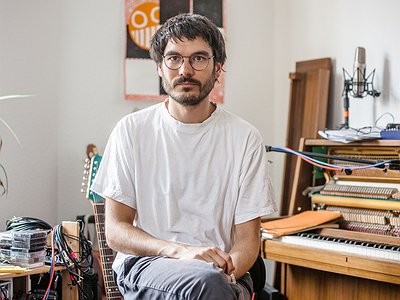Name: Markus Rom
Nationality: German
Occupation: Multi-instrumentalist, producer, composer, improviser
Current release: Markus Rom is one of the artists contributing to Damian Dalla Torre's debut album Happy Floating, which is out via Fazer. On it, Damian joins forces with a string of like-minded spirits from the German and UK jazz scene, further including Ruth Goller, Alex Binder, Heidi Bayer, Theresia Philipp, Antonia Hausmann, Jan Roth, and Bertram Burkert.
[Read our Ruth Goller / Vula Viel interview]
[Read our Theresia Philipp interview]
[Read our Damian Dalla Torre interview]
If these thoughts by Markus Rom piqued your interest, visit his minimalist website. He is also on Instagram.
When did you first start getting interested in musical improvisation?
As soon as I realized that improvisation in music is possible I was overwhelmed with the possibilities.
Unfortunately it had to take until I was about 15 for me to learn that it even exists.
Which artists, approaches, albums or performances involving prominent use of improvisation captured your imagination in the beginning?
In terms of improvising within boundaries, "Risky Business" by [Germ,an jazz band] Der Rote Bereich was probably the biggest eye-opener.
In terms of improvising with parameters, i.e. playing fixed patterns and improvising with sound at the same time, I was (and still am) very inspired by all kinds of indie music.
What, would you say, are the key ideas behind your approach to improvisation? Do you see yourself as part of a tradition or historic lineage?
Of course every musician bases their output on some kind of tradition, but I think it’s best not to keep that in mind while making music. Better to look for influences that are not common to one’s background.
What was your own learning curve / creative development like when it comes to improvisation - what were challenges and breakthroughs?
I think for me, the most important realization was that I like it when it’s hard to tell if a piece of music is composed or improvised.
Tell me about your instrument and/or tools, please. How would you describe the relationship with it? What are its most important qualities and how do they influence the musical results and your own performance?
Although I come from the guitar and it feels very natural for me, I keep looking for other instruments and ways of creating sounds.
Towards the end of my studies, I realized I might be more of an overall sound-creator than a perfect guitar player. At that point it was a bit of a love-hate-thing with that instrument.
In the last years I found a way back and a good balance, I think.
How do you feel your sense of identity influences your collaborations? Do you feel as though you are able to express yourself more fully in solo mode or, conversely, through the interaction with other musicians? Are you “gaining” or “sacrificing” something in a collaboration?
It’s more a "limiting to" than "sacrificing", and that is something I also try in my solo music. It’s easier in a collective.
For you personally, how would you describe the relationship between a clear individual vision and cooperative results?
I find both very inspiring - having an output as an individual just as in a collective. Both ways lead to very different results and I’m glad to be able to do both.
Nik Bärtsch reduced the art of musicianship to three principles: 1) Listen! 2) Only play the essentials 3) Make the others sound good. What's your take on this and how do these principles pan out in practise?
I would change 3) to "collectively try to sound good".
In a live situation, decisions between creatives often work without words. How does this process work – and how does it change your performance compared to a solo performance?
In the best case, all the musicians involved have a similar idea of what they want to create. In an even better case the people know each other well and trust each other with their musical decisions.




